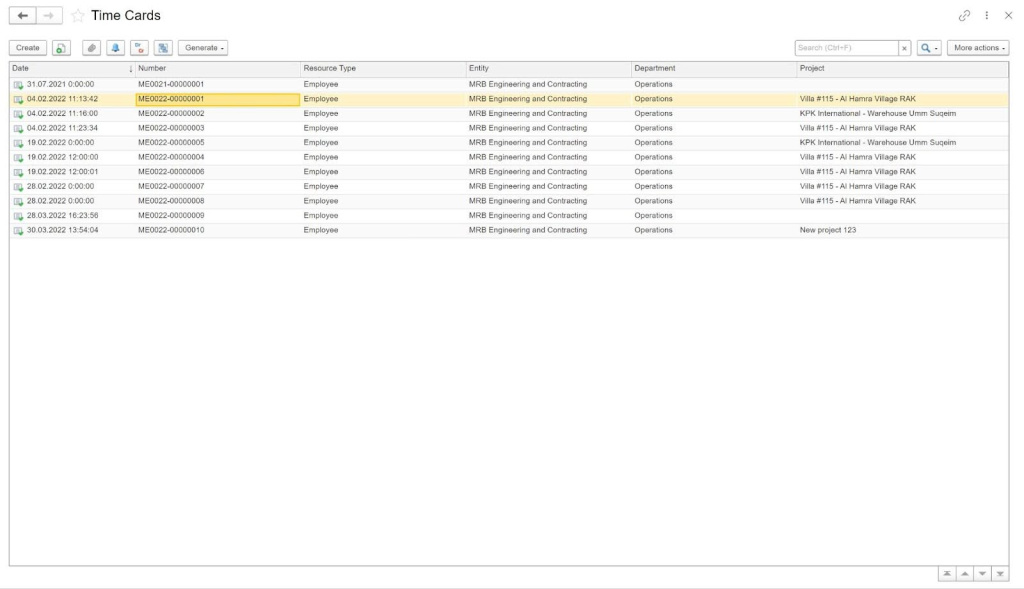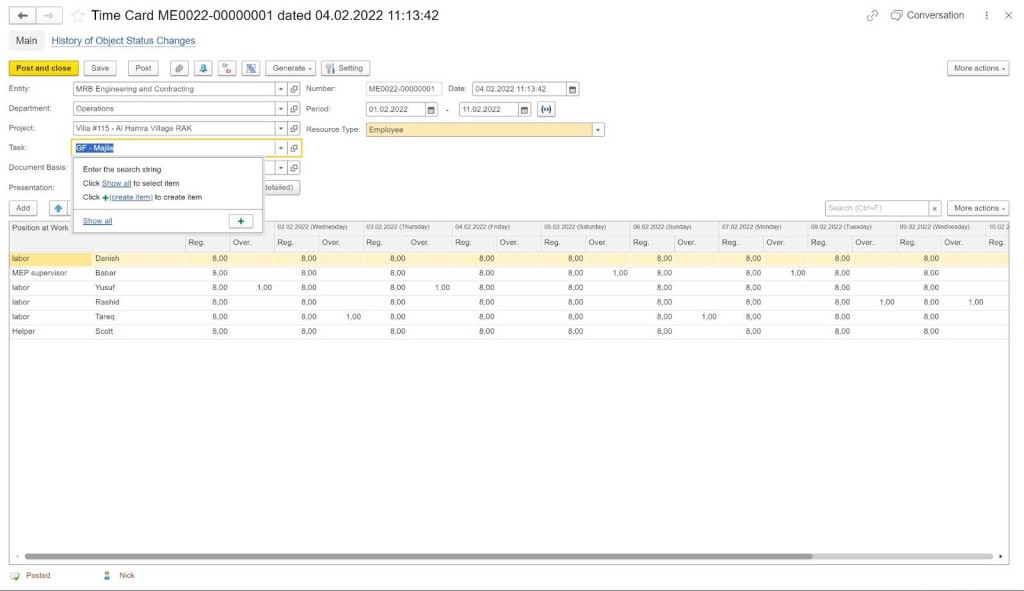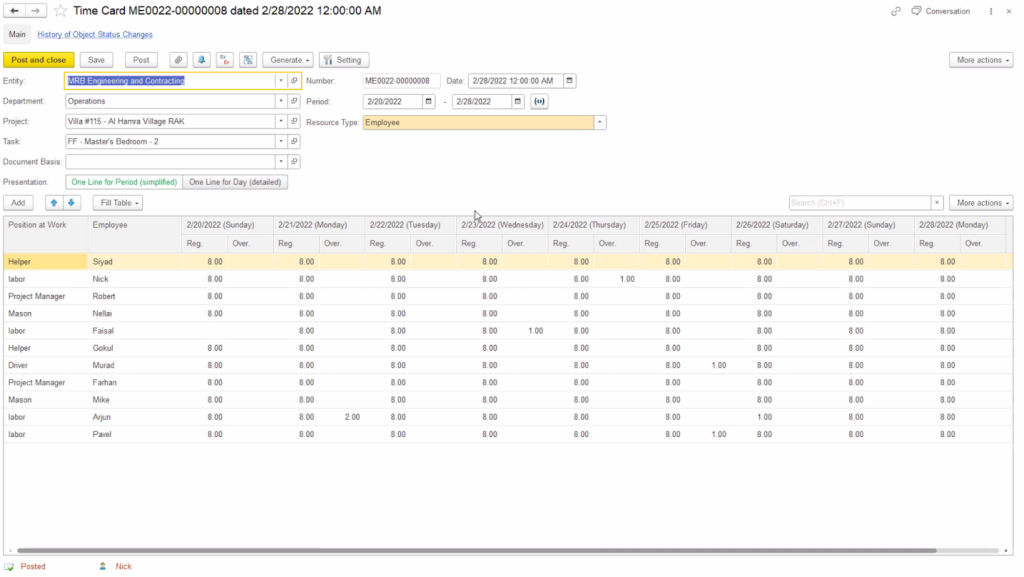Many contractors face challenges of managing cash flow, labor overcosting, which results in a big loss for the project. Time cards were invented to prevent your construction business from going down, and to optimize it they've been converted to a digital format.
In this article we will tell you about why it’s important, how to choose suitable software with time cards’ functionality, and give some tips for its better use.
What is a Time Card?
A time card serves as a record to monitor the employees working hours on a construction project. Cards include information such as the employee's name, hours worked, and rate of pay. Accuracy in completing time cards is crucial as they are a significant part of the project costing.
Types of Construction Time Cards
Construction time cards basically can be divided into 2 categories – digital and manual.
-
Manual time cards. This type requires the manual input of employee data, including hours worked, deductions, and other relevant information. Although still utilized by some companies, this type of construction time cards is less prevalent due to its inefficiencies and the risk of human error.
-
Digital time cards. This type of time card seamlessly integrates with various construction management tools, enhancing overall communication with stakeholders.
When selecting construction time card software, main features include mobile data collection, unlimited custom cost codes, overtime management, automated insights, and integrations with other construction management tools
First Bit provides the ERP solution with implemented systematic construction time card practices that enhances communication with stakeholders, provides real-time project visibility, and streamlines payroll processes.
Importance of Time Cards
Construction time cards play a crucial role in the construction industry for various reasons.
Employee Control
Construction time cards help tracking employee hours, ensuring accurate and timely payment, which is vital for employee retention. These accurate timesheets contribute to billing clients, effective project management, and enhancing overall employee productivity.
Whether digital or paper-based, construction timecards are employed to monitor the hours invested by employees and teams in specific construction projects. They guarantee fair compensation for all contributors, supporting precise payroll processing, adherence to labor laws.
Accurate Job Costing
Utilizing time cards you can calculate project costing and labor costs. Digital tools such as mobile apps or time clock software enable real-time data collection, providing detailed insights into project-specific time and cost breakdowns. This not only improves job costing accuracy but also aids in precise project estimates, better financial planning, and overall financial returns.
By integrating cost code data, time cards become essential for managing cash flow, protecting profits, and making informed bids for future projects. Automated time-tracking apps on mobile devices further boost accuracy and efficiency, benefiting the construction industry.
Estimates for Future Projects
Construction time cards provide valuable data that can be used to estimate labor costs for future projects. By keeping accurate time records, construction companies can easily estimate labor costs for upcoming projects, plan ahead, and make better financial decisions. Time card data, which includes detailed information on time spent on projects, broken up by cost codes, helps in making better estimates for future projects and allows for better financial planning.
Construction Time Cards Features
-
Clock-in/clock-out functionality. Enables your employees to log their shift start and end times simply.
-
Overtime tracking. Keeps track of when an employee has worked more than the standard number of hours in a day or week and calculates the overtime pay due.
-
Leave and absence tracking. Allows your employees submit time-off requests, which can then be approved or denied by managers. Construction time card software additionally manages leave accrual and provides notifications when an employee takes leave.
-
Integration with payroll systems. Enables seamless export and import of time card data into payroll software. Certain timecard tools can produce versatile reports suitable for payroll processing, billing, and monitoring employee attendance and productivity.
-
Mobile access. Enables your employees to conveniently clock in and out, request time off, and check their schedules using their mobile devices.
-
Project data monitoring. Digital tools prove invaluable for quick and efficient data analysis of labor costs, changes in timelines, and productivity.
-
Legal safeguard. Provides organized evidence of project work, facilitating easy validation of completed tasks if disputes arise.
Real-time visibility into work hours beyond the original project scope allows you for timely invoicing or adjustments to enhance time efficiency in response to project changes
Difficulties in Recording Working Hours
Workers' forgetfulness and inattention in recording hours can cause significant difficulties in the subsequent calculation of wages. Here, we describe the specific challenges that can arise.
Challenges in Manual Entry
One primary challenge is the inaccurate recording of working hours by workers. They may forget to clock in at the start of their shift or, alternatively, may clock in but neglect to clock out. In many cases, forepersons or managers might collect timesheets or log hours on behalf of workers, leading to some inaccuracies and errors. For example:
- Payroll issues. Inaccurate time tracking can cause payroll issues, as employees may not be paid for the hours they worked or may be overpaid for hours they didn't work.
- Lack of accountability. Workers who forget to clock-in may not be held accountable for their work hours, which can lead to a lack of motivation and productivity.
- Legal issues. Employers are required to keep records of employees' working hours, and failure to do so can lead to legal issues and potential penalties.
- Project delays. Inaccurate time tracking can cause project delays, as managers may not be aware of the actual progress and may allocate resources inefficiently.
- Buddy punching. Some employees can cheat and ask their coworkers to clock them in or out when they are in fact absent. This can also lead to all the issues mentioned above.
Retrieving and tracking paper time cards can consume a considerable amount of time for payroll, given the repetitive nature of the task.
Unnoticed errors may result in inaccurate data, affecting the foundation for future projects and potentially leading to significant costs for your company.[?]
Challenges in Digital Time Tracking
Digital time tracking software aims to address most of the challenges, but it has drawbacks as well.
- Hesitancy due to language barriers. According to the International Labour Organization (ILO), the UAE has an estimated population of 9.3 million, with 8.7 million migrant workers, most of whom are temporary contract workers.[?] When these workers need to fill out timesheets in English, they often face challenges and may depend on others for help, increasing the risk of errors and inaccuracies in the records.
- Lacking payroll integration. When adopting technology, construction firms should carefully consider the features they need. While there are numerous time tracking applications available, selecting ones that integrate with their existing payroll system is an important thing. Otherwise, you may choose to utilize a complex solution which provides both features in one software such as ERP.
- Complicated user interface (UI). Simplified UI is crucial for construction workers to adopt an application with ease. A straightforward, user-friendly design is essential to avoid user hesitancy and ensure effective utilization.
First Bit Construction Time Card Software
FirstBit ERP software has features which can help you to handle the challenges you face.
Save on Labor Costs
Accurately monitoring employee hours helps identify discrepancies and unauthorized work, preventing unnecessary labor expenses.
Here is a time cards list. You can create cards separately for each of your construction projects.
Consistent card control can optimize staffing levels, allocate resources efficiently, and cut overall business costs.
Manage Overtime
Monitoring weekly overtime hours allows businesses to adjust schedules, reducing the need for costly overtime pay.
Choose the project name you need, check the task, and watch the number of workers on it. Information about the hours is available in the table.
Also you can create or choose project tasks and assign it to labor while filling in the table with details of their work.
Efficient overtime management leads to substantial annual savings by ensuring overtime is used only when necessary.
You can also monitor a number of workers on several project simultaneously:
Time tracking software ensures compliance with labor laws, reducing the risk of legal issues and associated costs. Avoiding labor law violations is crucial to saving on potential legal expenses and fines.

Anna Fischer
Construction Content Writer

See FirstBit ERP solutions in action
Discover how our system solves the unique challenges of contractors in a personalized demo.
After the demo you will get a quotation for your company.
After the demo you will get a quotation for your company.













